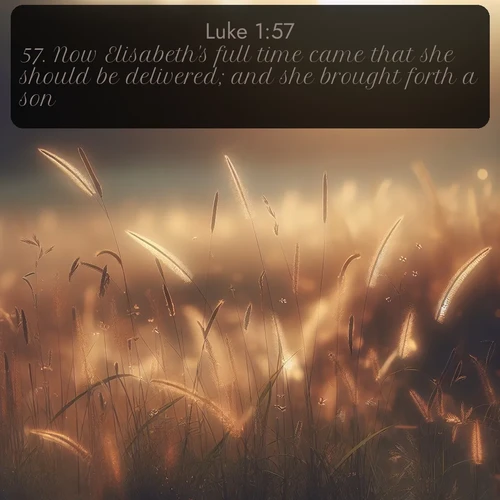Gospel of Luke 1:57 plusieurs versions / traductions
English Bible Translations
57. Now Elisabeth's full time came that she should be delivered; and she brought forth a son.
57. Now Elisabeth's time was fulfilled that she should be delivered; and she brought forth a son.
57. But the time was fulfilled for Elizabeth that she should bring forth, and she gave birth to a son.
57. Now Elisabeth's full time came that she should be delivered; and she brought forth a son.
57. And to Elisabeth was the time fulfilled for her bringing forth, and she bare a son,
German Bible Translations
57. Und Elisabeth kam ihre Zeit, daß sie gebären sollte; und sie gebar einen Sohn.
57. Für Elisabeth aber erfüllte sich die Zeit, da sie gebären sollte, und sie gebar einen Sohn.
French Bible Translations
57. Le moment où Elisabeth devait accoucher arriva et elle mit au monde un fils.
57. Le temps où Elisabeth devait accoucher arriva, et elle enfanta un fils.
57. Or le temps où elle devait accoucher fut accompli pour Élisabeth, et elle mit au monde un fils.
57. Or le terme d'Elisabeth fut accompli pour accoucher; et elle mit au monde un fils.
Versions with Strong Codes
Luke 1 / KJV_Strong57. Now[G1161] Elisabeth's[G1665] full time[G5550] came[G4130] that she[G846] should be delivered;[G5088] and[G2532] she brought forth[G1080] a son.[G5207]
Strong Code definitions
G1161 de/deh a primary particle (adversative or continuative); but, and, etc.:--also, and, but, moreover, now (often unexpressed in English).
G1665 Elisabet/el-ee-sab'-et of Hebrew origin (472); Elisabet, an Israelitess:--Elisabeth. see H472
G5550 chronos/khron'-os of uncertain derivation; a space of time (in general, and thus properly distinguished from G2540, which designates a fixed or special occasion; and from G165, which denotes a particular period) or interval; by extension, an individual opportunity; by implication, delay:--+ years old, season, space, (X often-)time(-s), (a) while. see G2540 see G165
G4130 pletho/play'-tho, a prolonged fo 4130] (pletho/play'-tho, a prolonged form of a primary) certain tenses and in the reduplicated form pimplemi) to "fill" (literally or figuratively (imbue, influence, supply)); specially, to fulfil (time):--accomplish, full (...come), furnish.
G846 autos/ow-tos' from the particle au (perhaps akin to the base of G109 through the idea of a baffling wind) (backward); the reflexive pronoun self, used (alone or in the comparative 1438) of the third person , and (with the proper personal pronoun) of the other persons:--her, it(-self), one, the other, (mine) own, said, (self-), the) same, ((him-, my-, thy- )self, (your-)selves, she, that, their(-s), them(-selves), there(-at, - by, -in, -into, of, -on, -with), they, (these) things, this (man), those, together, very, which. Compare 848. see G109 see G1438 see G848
G5088 tikto/tik'-to a strengthened form of a primary teko tek'-o (which is used only as alternate in certain tenses); to produce (from seed, as a mother, a plant, the earth, etc.), literally or figuratively:--bear, be born, bring forth, be delivered, be in travail.
G2532 kai/kahee apparently, a primary particle, having a copulative and sometimes also a cumulative force; and, also, even, so then, too, etc.; often used in connection (or composition) with other particles or small words:--and, also, both, but, even, for, if, or, so, that, then, therefore, when, yet.
G1080 gennao/ghen-nah'-o from a variation of G1085; to procreate (properly, of the father, but by extension of the mother); figuratively, to regenerate:--bear, beget, be born, bring forth, conceive, be delivered of, gender, make, spring. see G1085
G5207 huios/hwee-os' apparently a primary word; a "son" (sometimes of animals), used very widely of immediate, remote or figuratively, kinship:--child, foal, son.
Prédications qui analysent les thèmes Évangile selon Luc 1
Thèmes : Annonciation; Visite de Marie; Naissance de Jean; Annonciation à Marie; Louange de MarieLa faiblesse apparente de la naissance de Jésus
Fil Rouge de la Bible 11a: Jésus de Nazareth sa naissance (Matthieu 1-3)
Related Sermons discussing Gospel of Luke 1
Themes : Annonciation; Visite de Marie; Naissance de Jean; Annonciation à Marie; Louange de MarieChristmas theme: Who was really waiting for Jesus?
Christmas / The Incarnation: The apparent weakness of the birth of Jesus is triumphant
Red Thread of the Bible 11b: The life of Jesus of Nazareth (Matthew 1 – 3)
Bible Red Thread 11a: Jesus of Nazareth His Birth (John 1)
see also: Bible Key Verses ; KJV Bible Images, BBE Bible images

